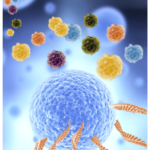Link to Pubmed [PMID] – 30025542
Link to DOI – 10.1186/s12887-018-1189-5
BMC Pediatr 2018 Jul; 18(1): 236
Globally one out of four children under 5 years is affected by linear growth delay (stunting). This syndrome has severe long-term sequelae including increased risk of illness and mortality and delayed psychomotor development. Stunting is a syndrome that is linked to poor nutrition and repeated infections. To date, the treatment of stunted children is challenging as the underlying etiology and pathophysiological mechanisms remain elusive. We hypothesize that pediatric environmental enteropathy (PEE), a chronic inflammation of the small intestine, plays a major role in the pathophysiology of stunting, failure of nutritional interventions and diminished response to oral vaccines, potentially via changes in the composition of the pro- and eukaryotic intestinal communities. The main objective of AFRIBIOTA is to describe the intestinal dysbiosis observed in the context of stunting and to link it to PEE. Secondary objectives include the identification of the broader socio-economic environment and biological and environmental risk factors for stunting and PEE as well as the testing of a set of easy-to-use candidate biomarkers for PEE. We also assess host outcomes including mucosal and systemic immunity and psychomotor development. This article describes the rationale and study protocol of the AFRIBIOTA project.AFRIBIOTA is a case-control study for stunting recruiting children in Bangui, Central African Republic and in Antananarivo, Madagascar. In each country, 460 children aged 2-5 years with no overt signs of gastrointestinal disease are recruited (260 with no growth delay, 100 moderately stunted and 100 severely stunted). We compare the intestinal microbiota composition (gastric and small intestinal aspirates; feces), the mucosal and systemic immune status and the psychomotor development of children with stunting and/or PEE compared to non-stunted controls. We also perform anthropological and epidemiological investigations of the children’s broader living conditions and assess risk factors using a standardized questionnaire.To date, the pathophysiology and risk factors of stunting and PEE have been insufficiently investigated. AFRIBIOTA will add new insights into the pathophysiology underlying stunting and PEE and in doing so will enable implementation of new biomarkers and design of evidence-based treatment strategies for these two syndromes.







